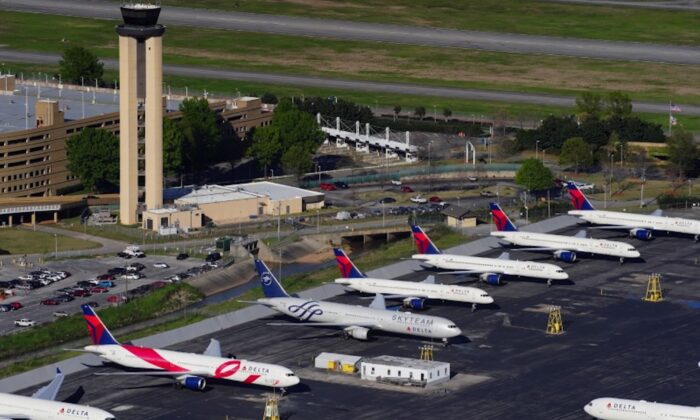Speaker Nancy Pelosi Confirms that Phase 3 Relief Bill is Nearing Finish Line
The U.S. Senate offered struggling airlines unprecedented aid worth $58 billion that will helping cover their staff wages, as carriers around the world seek state support and turn passenger planes into cargo liners in their desperate bid for revenues.
The CCP virus crisis has ravaged the travel industry and grounded many of the world’s planes, prompting governments to take previously unthinkable steps to prevent bankruptcies, ranging from state handouts to temporarily halting competition rules.
“For airlines, it’s apocalypse now,” said Alexandre de Juniac, director general of the International Air Transport Association (IATA), which represents carriers around the world.
“Travel restrictions and evaporating demand mean that, aside from cargo, there is almost no passenger business,” he said.
IATA, which estimates the pandemic will cost the global industry $252 billion in lost revenues this year, said it had written to 18 countries in the Asia-Pacific region, including India, Japan and South Korea for emergency support for carriers.
Airlines UK, representing carriers in Britain, asked the government for tax and air traffic fee holidays.
The U.S. Senate passed an industry aid package, half in the form of grants to cover some 750,000 employees’ paychecks. Companies receiving funds cannot lay off employees before Sept. 30 or change collective bargaining agreements.
The bill has restrictions on stock buybacks, dividends and executive pay, and allows the government to take equity, warrants or other compensation as part of the rescue package.
The U.S. House of Representatives is expected to back the move on Friday. President Donald Trump has promised to sign it.
United Airlines Holdings said capacity would drop by 68% in April and Alaska Air Group said it would cut its schedule by 70% in April and May. American Airlines suspended its dividend, drew down a $400 million credit line and secured an additional loan.
Cutting Jobs
In Asian countries, Singapore, Australia and New Zealand have announced some financial relief for airlines, but this has not stopped carriers from putting staff on leave and grounding planes.
Singapore’s finance minister Heng Swee Keat said Singapore Airlines Ltd would soon announce “corporate action” supported by state investor Temasek Holdings to tackle the crisis. Share trading in the carrier, which said this week it was seeking extra funds, was halted on Thursday.
Virgin Australia plans to permanently cut more than 1,000 jobs among the 8,000 staff that have already been stood down. Australia’s Flight Centre Travel Group said it would cut 6,000 travel agent roles globally.
In a move unthinkable under normal conditions, Australia’s competition regulator said it would allow Virgin, Qantas Airways and Regional Express to coordinate flight schedules and share revenue on 10 regional routes.
“We hope that this temporary measure will also support airlines’ ability to again compete with each other on these routes once the pandemic crisis has passed,” Australian Competition and Consumer Commission Chairman Rod Sims said.
 Australian Competition and Consumer Commission (ACCC) Chairman Rod Sims speaks during an interview with Reuters in Sydney, Australia, on Oct. 31, 2016. (Reuters/Jason Reed)
Australian Competition and Consumer Commission (ACCC) Chairman Rod Sims speaks during an interview with Reuters in Sydney, Australia, on Oct. 31, 2016. (Reuters/Jason Reed)In bid to raise revenue and keep some planes flying, Delta Air Lines and Air New Zealand joined others in offering cargo flights and charters on passenger planes.
About half of the world’s air cargo normally travels in the bellies of passenger planes, so the cancellation of passenger flights has led to a sharp reduction in cargo capacity.
“We’ve shared these options with our global cargo customer base and are getting some strong interest from customers wanting to ship to and from Shanghai, Hong Kong, San Francisco, Los Angeles, Sydney and Melbourne,” said Rick Nelson, Air New Zealand’s general manager for cargo.
Abu Dhabi’s Etihad Airways said it would operate 34 weekly cargo-only flights with Boeing 787 Dreamliner passenger jets to India, Thailand, Singapore, Philippines, Indonesia and South Korea.
Hawaiian Airlines said it had added more cargo-only turboprop flights between the state’s islands.
Roughly 1,800 planes had been grounded globally on Monday and Tuesday, according to aviation research firm Cirium.
By Jamie Freed and Joe Brock
This article is from the Internet:US Senate Offers $58 Billion Aid to Airlines as They Struggle to Stay Airborne
Florida Gov. Ron DeSantis Says Stay-at-Home Order Would Be ‘Inappropriate’
